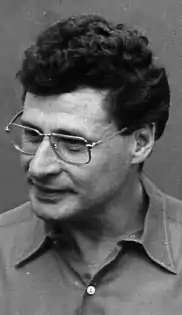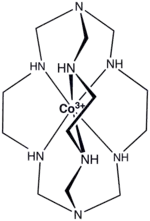Alan Sargeson
Alan McLeod Sargeson FAA FRS[1] (30 October 1930 – 29 December 2008) was an Australian inorganic chemist.
Alan Sargeson | |
|---|---|
 | |
| Born | 30 October 1930 Armidale, New South Wales, Australia |
| Died | 29 December 2008 (aged 78) |
| Scientific career | |
| Fields | chemistry |
| Thesis | The metal oxygen band in inorganic complexes (1957) |
| Doctoral advisor | Francis Patrick Dwyer |
Education and early life
Sargeson was born at Armidale, New South Wales, Australia. He was educated at the University of Sydney and received his Ph.D. supervised by Francis Patrick Dwyer also at Sydney in 1956.
Career and research

His first academic appointment was at the University of Adelaide and then in 1958 he rejoined Dwyer at the Australian National University.[2]
Sargeson was best known as a coordination chemist with an interest in bioinorganic chemistry. In early work with Dwyer and throughout his career, he studied stereochemistry. His research group investigated the reactions of amine ligands, culminating in the synthesis of the clathrochelates called "sepulchrates".[3]
Awards and honours
He was elected a Fellow of the Royal Society (FRS) in 1983[1] and the Australian Academy of Science, and a corresponding member of the U.S. National Academy of Sciences.
References
- Bosnich, Brice (2011). "Alan McLeod Sargeson FAA. 13 October 1930 – 29 December 2008". Biographical Memoirs of Fellows of the Royal Society. 58: 265–282. doi:10.1098/rsbm.2011.0017.
- Leonard F. Lindoy "Celebration of inorganic lives: Interview with Alan M. Sargeson" Coordination Chemistry Reviews 2005, volume 249, pp. 2731–2739.doi:10.1016/j.ccr.2005.04.015
- J. Macb. Harrowfield; A. J. Herlt; A. M. Sargeson (1980). Caged Metal Ions: Cobalt Sepulchrates. Inorg. Synth. Inorganic Syntheses. 20. pp. 85–86. doi:10.1002/9780470132517.ch24. ISBN 9780470132517.